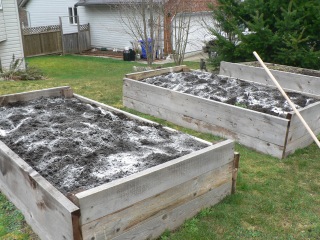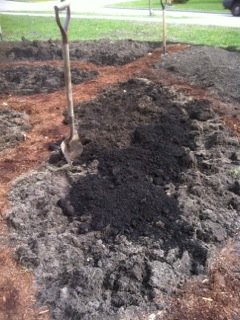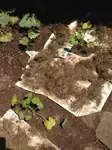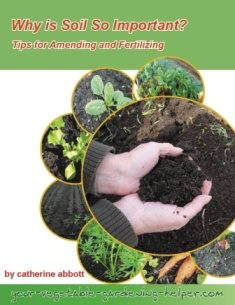Organic Gardening Soil Amendments
Organic gardening soil amendments are materials added to the soil to enrich the soil fertility and structure.
There are three methods of adding organic gardening soil amendments to your soil.
- You can cultivate the amendments directly to your soil. The nutrients are released as the material decomposes which will occur quickly when they are broken down which the tilling will do.
- Another method is laying the material on the soil as a mulch where it will rot into humus over time. This is probably the easiest method, but takes the longest to decompose.
- You can make your own compost and then add it directly to your garden beds. Making compost can be done quickly over several weeks or it may take longer depending on how well you want to manage it.
All three methods for adding organic gardening soil amendments can be used in your garden or choose any one method that works best for you.
Adding in the organic matter and organic fertilzer will increase your soil fertility giving you healthier vegetable plants and a more productive harvest.
List of organic gardening soil amendments:
Alfalfa
This is a leguminous plant used for fodder, pasture and cover crop. It comes in crushed or pellet form. Purchase alfalfa meal or pellets at animal feed stores. Some garden nurseries may sell it as well.
- Adds nitrogen, potassium, some phosphorus to your soil.
- Use in your compost pile or as a mulch.
Bark
This can be purchased in garden centers, shredded in your own garden, or often given away by local tree trimming businesses.
Use finely chipped bark because it covers the soil better not allowing weeds to grow. Try to use hard wood bark if you can get it.
Cedar is best not used in your garden beds as it has oils in it that are not good for your plants. Instead use cedar chips or bark on our pathways to suppress weed growth.
- Adds organic matter to your soil.
- Use as a mulch. Shredded is best for blocking out weeds.
Blood Meal
This can be purchased at garden centers or at animal feed stores.
- Adds nitrogen.
- Use in your compost or add directly to your soil as an organic fertilizer.
Bone meal
This is made from crushed animal bone and can be purchased at any garden center or nursery.
- Adds phosphorus and some nitrogen.
- Use in your compost or add directly to your soil. Place in the hole when transplanting.
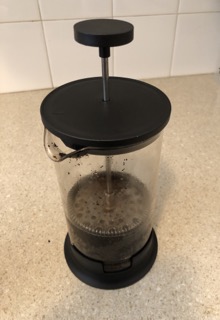 Keep your daily coffee grounds.
Keep your daily coffee grounds.Coffee Grounds
Check with your local coffee shop as they will often give away their coffee grounds rather than put them in the garbage.
- Adds nitrogen, some phosphorus and potassium to your soil.
- Put into your compost pile.
Dolomite Lime
This is a compound containing calcium and/or magnesium. It can be purchased at your local garden center or nursery.
- Adds calcium and magnesium to your soil.
- Applied directly to the soil and used to raise pH, learn more.
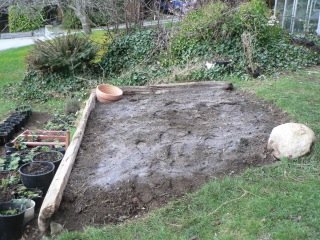 Add lime to your soil if you need to raise the pH level.
Add lime to your soil if you need to raise the pH level.Fish Fertilizer
This can be purchased at your local garden center or nursery.
- Adds nitrogen, phosphorus and trace elements to your soil.
- Used as a liquid fertilizer. It is usually diluted it in water; read the package for instructions.
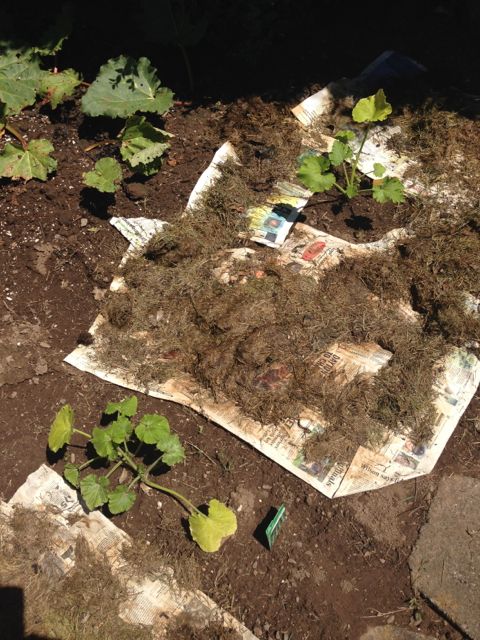 Collect your grass clippings, make sure they are free of pesticides.
Collect your grass clippings, make sure they are free of pesticides.Grass Clippings
Keep your own clippings or ask neighbors for theirs. Make sure the grass has not been chemically fertilized or it cannot be used as an organic gardening soil amendment.
- Adds nitrogen to the soil.
- Use as a mulch or add to the compost pile.
Greensand
Is also known as glauconite. This is an ancient seabed deposit containing some potassium and has a broad spectrum of micronutrients. This can be purchased at garden centers and nurseries.
- Adds potassium and trace minerals.
- Used as a fertilizer; add it to the compost or directly to the soil
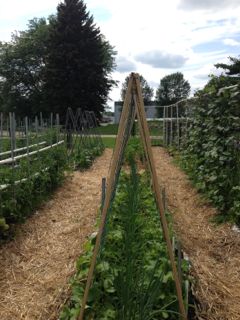 Straw or hay are great to add to garden beds.
Straw or hay are great to add to garden beds.Hay or Straw
Find a local farmer who grows and cuts from their own fields or can also be purchased at some garden centers or animal feed stores.
- Adds organic matter to soil.
- Use as a mulch or can be tilled under in the fall
Kitchen Scraps
Collecting your own kitchen waste (not including any meat products) is probably the easiest. Often you can pick up vegetable waste from grocery stores or local restaurants so if you are looking for more than you can produce check these out.
- Adds nutrients and organic matter to the soil.
- Use in your compost. Do not add meat or greasy materials to the compost.
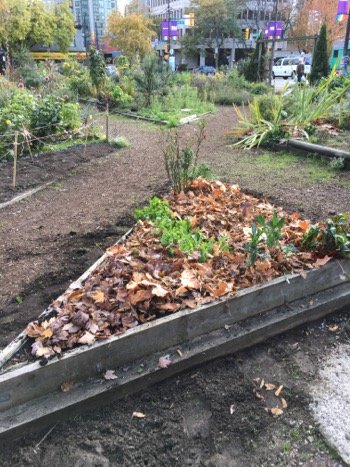 Collect leaves, shredding them is best.
Collect leaves, shredding them is best.Leaves
Any type of leaves will work well as an organic gardening soil amendment. I collect leaves in the fall from neighbors and areas near where I live.
I then crush them by running them over with my lawn mower or weed eater. I then place them directly on my garden beds or store them to be added to my compost over the winter. Brassicas grow well in beds where composted leaves are added.
- Adds nutrients and organic matter to the soil.
- Use as mulch and in your compost. Shred before using.
Manure
Animal waste can be purchased at garden centers and nurseries by the bag. It is best to find a local organic animal farmer who is willing to give away or sell his animal waste.
Any animal manure is great to use except for dog or cat feces. Check out what manure is best for your garden.
- Adds nitrogen and mineral content to your soil.
- Used as a soil conditioner and fertilizer. Make sure it is aged for 6 months or more before using directly on your garden.
Peat Moss
This is partially decomposed plant life taken from bogs and used as a rooting medium or soil conditioner. This organic gardening soil amendment can be purchased at garden centers and nurseries.
- Adds organic matter to the soil and helps soil retain moisture.
- Put it directly on the soil and till under.
Phosphate Rock
This is finely ground, natural rock powder. It is one of the three major plant nutrients. It is designated by the letter P.
- Adds phosphorus and minerals.
- Use as a fertilizer in your compost or add directly to the soil.
Potash Rock
This is crushed rock and another one of the three major plant nutrients. It is designated by the letter K.
- Adds potassium.
- Use as a fertilizer in your compost or add directly to the soil.
Sawdust
This is the waste left from cutting wood. It is best to use any sawdust except for cedar in your garden beds. Cedar sawdust has oils that are not good for your veggies, so use it only in your pathways. This can be purchased at garden centers or at sawmills if you have any in your area.
- Adds organic matter to your soil.
- Use as a mulch; great for pathways.
Seaweed
This is a sea plant that is washed up on beaches usually after big storms. It is most available in the fall and winter months and is a great organic gardening soil amendment.
- Adds potassium, some nitrogen, phosphorus and trace elements.
- Use fresh seaweed in your compost pile. It can also be purchased in a dry concentrate which can be diluted in water and used as a fertilizer tea.
Tea Grounds
- Adds a variety of nutrients.
- Use in the compost pile.
Weeds
These will add green matter to your compost pile. Make sure you only use weeds that have not gone to seed and have no disease. Destroy others so they do not contaminate your compost.
- Adds varying nutrient content and trace minerals.
- Add to the compost pile.
Wood Ash
This is the grayish powder left after wood has been burned. After cleaning out your wood stove or wood burning fireplace place the ash on your garden beds or in the compost.
- Adds nutrient content and trace elements.
- Use in the compost pile or add directly to your soil.
Wood Chips
This is bark, just in larger pieces. Check with your local tree trimming companies to see if they are giving it away or it can be purchased at local garden centers and nurseries.
- Adds organic matter to your soil.
- Use as a mulch in pathways. If adding to your garden beds you will need to add plenty of nitrogen to your soil first.
Adding organic gardening soil amendments is an important step to creating a healthy garden soil. Check out my 6 steps to a vegetable garden.
Return from Organic Gardening Soil Amendments to Organic Vegetable Gardening
Recent Articles
-
Organic Gardening soil amendments - List of material?
Aug 09, 25 10:57 AM
What materials are best used as organic gardening soil amendments? -
Tips for disease control in your vegetable garden
Jul 14, 25 11:15 AM
Easy tips for disease control to keep your vegetable growing its best. -
Joy of vegetable Gardening
Jul 14, 25 11:01 AM
Everything you need to know is right here to have Joy of Vegetable Gardening
